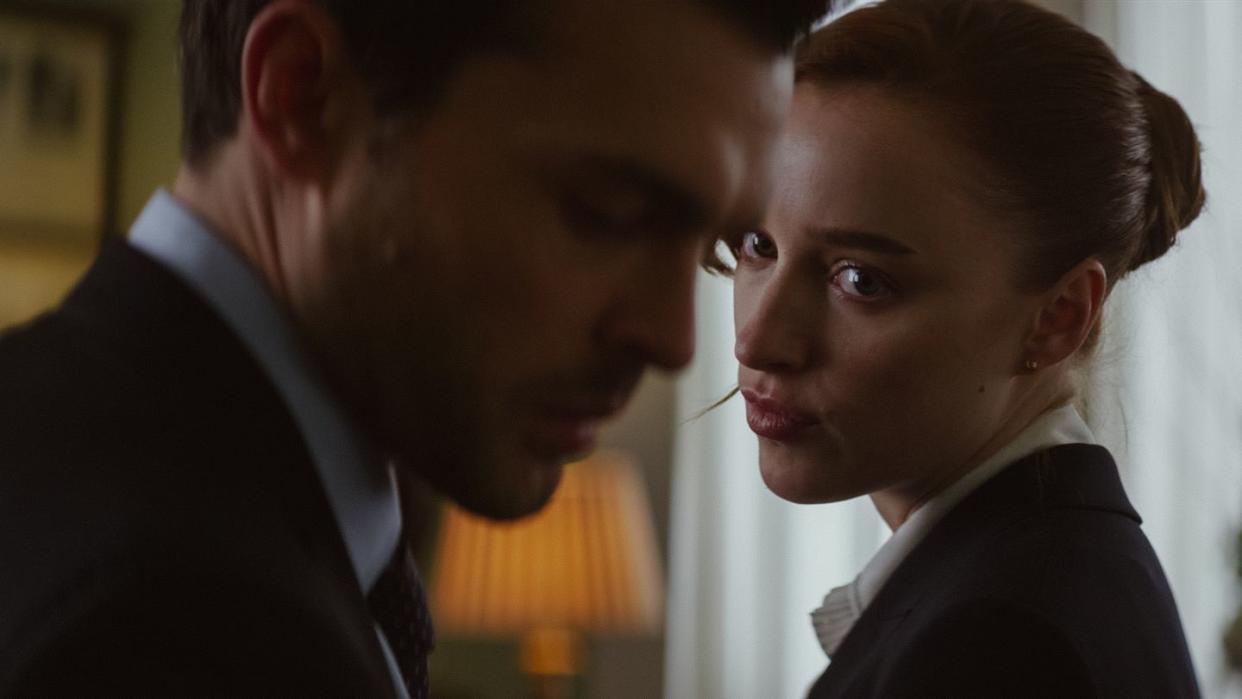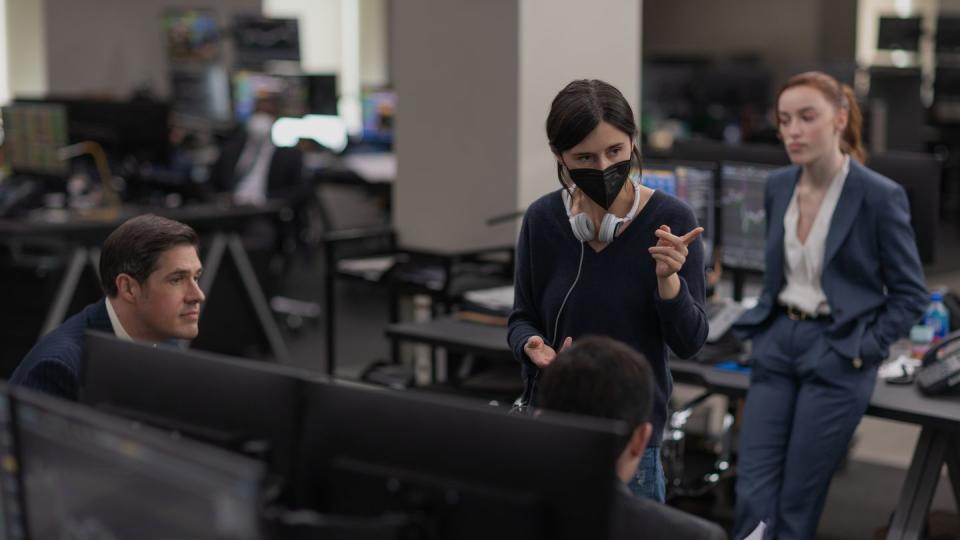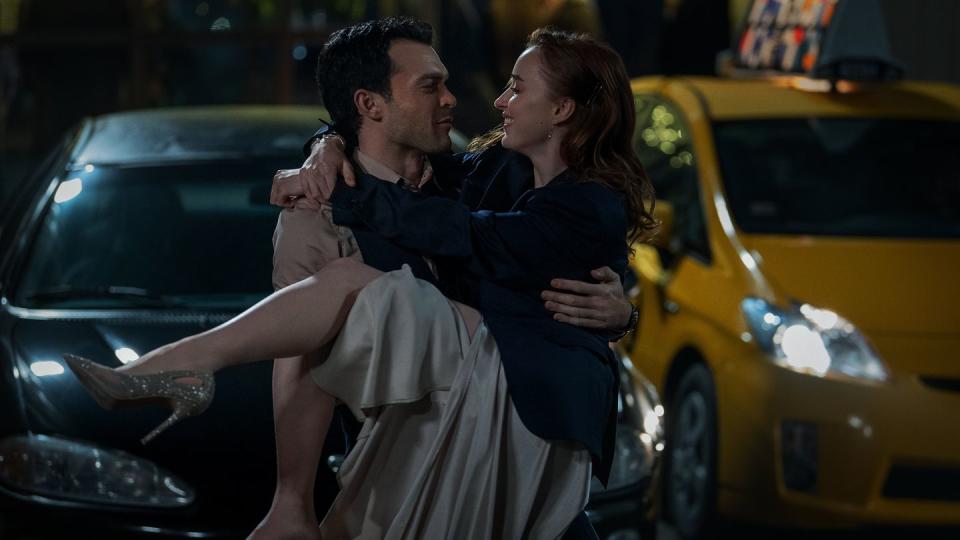Chloe Domont Wants 'Fair Play' to Move and Mortify You

- Oops!Something went wrong.Please try again later.
- Oops!Something went wrong.Please try again later.
“It took me a while to sit down and actually decide that this was the story I needed to tell,” Chloe Domont tells me over Zoom. We’re chatting about how gender roles inspired the writer-director's debut film, Fair Play—which, by the way, has already won critics' approval. It's probably why, following the film's Sundance premiere in January, Netflix bought the film for a whopping $20 million.
Fair Play follows Emily and Luke, a young couple played by Phoebe Dynevor and Alden Ehrenreich, respectively. They’re attractive, romantic, driven, and supportive of each other's careers at a cutthroat investment firm—until Emily receives a coveted promotion. Soon after, Luke falls into a pattern of self-pity and pettiness, but what begins as an uncomfortable circumstance turns into psychological warfare as both Luke and Emily fall victim to societal expectations.
Though Fair Play is firmly a thriller, its scariest moments are incredibly subtle. The most chilling interaction comes during a brief scene after Emily receives her promotion. Instead of celebrating, Emily tells her boyfriend that she’s “sorry.” It’s an earnest apology. She regrets that he didn’t get the job—but, perhaps more importantly, she’s sorry for being worthy of it. “That was the first scene that came to me when writing this,” Dumont explains. “She gets the promotion and her first reaction isn’t excitement. It’s fear.”
From that point on, the 36-year-old Domont explores how fear can torment even the happiest relationships. With the addition of sexism, a demanding boss, and judgmental peers, Fair Play becomes an eerily familiar road to disaster. The film will see a limited theatrical release on on September 29, ahead of its Netflix debut on October 6. Watch an exclusive new trailer for Fair Play below—and keep reading to learn why Domont needed to tell this story of psychological warfare.
ESQUIRE: Congratulations on your first feature film. How are you feeling leading up to Fair Play's theatrical release?
CHLOE DOMONT: I'm really excited. It’s been a long road to get here and I put everything into this movie. It is exactly what I set out to do, and it came out the way I wanted it to. I'm just excited to put it out there to a larger audience. We’ve done smaller screenings for Sundance and Toronto [film festivals], and those have been incredible. But I want to see what the world has to say about it.
Tell me about some of the feedback you've heard so far.
People seem to be on the edge of their seats. They’re locked in and I definitely have them by the throat, which is what I set out to do. But on a more important level, women have come up to me saying they’ve felt deeply seen by the film in a way that they haven’t before.
People are questioning things they’ve done in their past. It stirred a lot of reflection, and caused people to be open about their own experiences in relationships with these kinds of dynamics. The conversations that are coming out of that are incredibly exciting.

When did you realize it was the right time to make this movie?
I got to a place where I was just normalizing these dynamics within the relationships that I was having. I was undermining my success and undermining my excitement for my professional career while dating different men. Some experiences were more subtle and some experiences were more explicit, but the normalization of what was happening became upsetting and untenable.
Part of why I wrote the first draft was to sound the alarm—to say this is something that we need to be talking about because this is something we all deal with. If we want to work through it, we have to be able to acknowledge it.
Fair Play is rooted in the complexities of Emily and Luke’s relationship. Their chemistry is really believable, especially when they’re at their worst as a couple. How did you find the right Emily and the right Luke?
Emily is a rising star in the finance world. It was important for me to find an actor who was also a rising star, and Phoebe [at the time] was just coming off of Bridgerton. There was a lot of buzz around her, but she hadn't done a feature film, so I was drawn to that. Then, I watched the pilot of Bridgerton and I was really captivated by her performance. She was incredibly present and dialed in, and there were a lot of qualities that I felt could translate for Emily. There was a vulnerability that I saw there. A fierceness. The way that distress reads in her eyes was very magnetic. More than that, being able to push her places that she hasn’t been to before was also exciting to me.
In terms of Alden, I've been a fan of his since Hail, Caesar! He’s been on my radar for a long time and what excited me was that he’d never done anything like this before. I really like to cast against type. Also, I needed the actor behind this role to be a very confident man on his own in order to go into that [character’s] level of insecurity. When I met with Alden, I could tell he was super comfortable in his own skin and just ready to dive in.
Were any of their scenes improvised?
There were lines here and there, but no scenes. I really honed the script for a long time, and I wanted to create a film that was shaped like a bullet. There wasn't a lot of room to have scenes where you just play. However, I would tell Aiden—once I felt like they got [the scene]— “have a free one.” He would stick to 80 percent of the script, and then he would throw in a line or try something new—like a different gesture or blocking. We definitely used some of that in the film.
What else were you hoping to accomplish with Fair Play?
I set out to make a thriller about power dynamics within a relationship. I wanted to give people a thrill ride that shocks them, moves them, and mortifies them—but I believed it needed to say something in the end. It needed to question the state of our world. Otherwise, all of that was for nothing.
It was really about the questions that drove me to write this—like, how can we dismantle this toxic link between female empowerment and male fragility? How can we demystify the role that men are raised into thinking they have to fill? How can women learn to embrace their successes without fearing that it’ll hurt [their partner]? Finally, how can we love and trust each other in a world that’s so dependent on the ingrained dynamics that get in the way of that love and trust and respect?

I’ve definitely talked about that with the women in my life. It’s nice to have those conversations with people of different generations, but it’s also disappointing to know that it affects all of us.
That’s why I wrote this film. We’re in progressive times, I live in a progressive city, and I’m with a progressive man. So, why am I still feeling these things? Why is this still a thing and why can we not talk about it? Now more than ever, it’s harder for people to talk about because no one wants to admit that’s what’s really going on. The men I’ve been with, they would never admit that they’re threatened or intimidated by their female partners' success. Because, what would that say about them? And I was always afraid to admit it [was happening], because what would that say about me and my choice of a partner? It got to the point where I was like, this is why I have to make this movie.
I wonder when that will feel less prevalent. How does this stop? How do we even tackle it?
Ultimately, this is a societal and systemic thing that needs to change. So many of us want to adhere to a modern, feminist, society, but we’re still raised with traditional ideals of masculinity. For the most part, we raise boys to believe that masculinity is an identity when it’s not. It’s an energy. If we can move away from that, if we can break free from these ingrained gender dynamics, then we’ll get past it.
You Might Also Like

